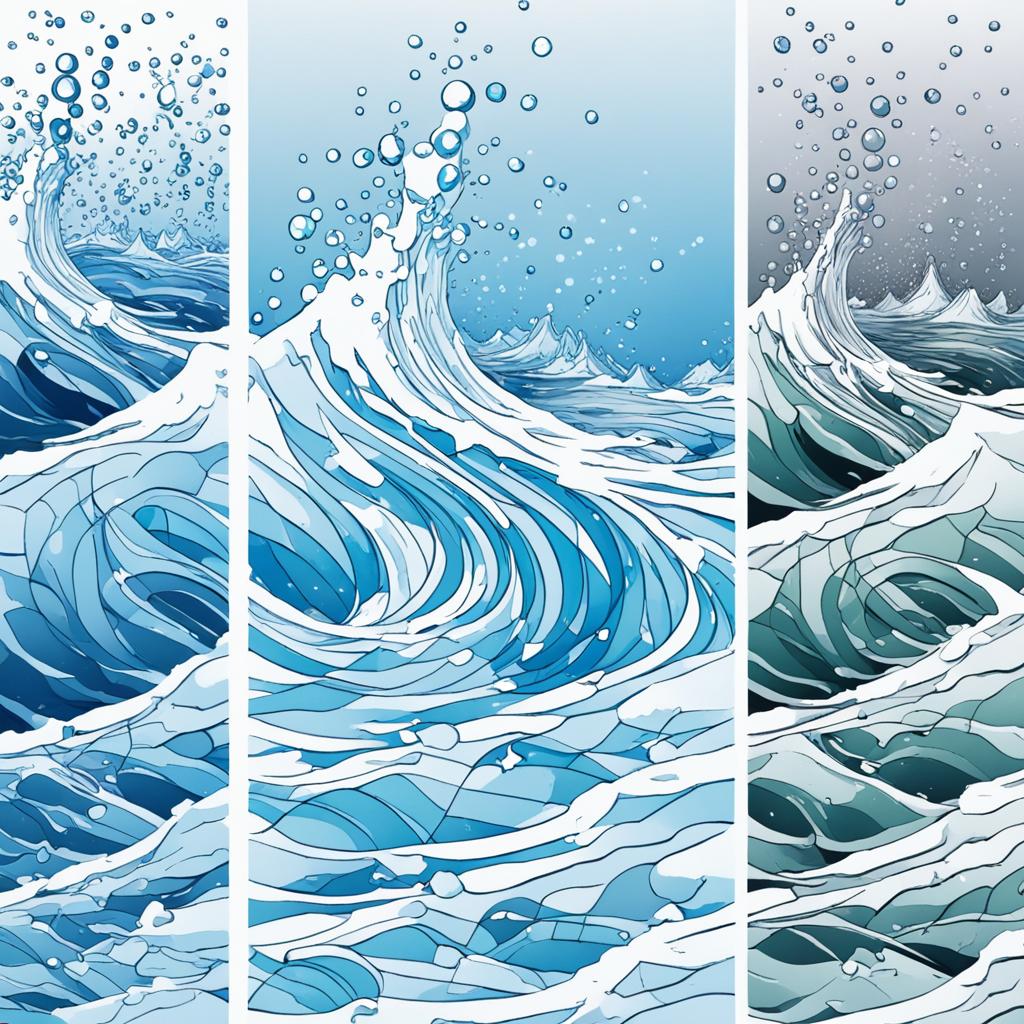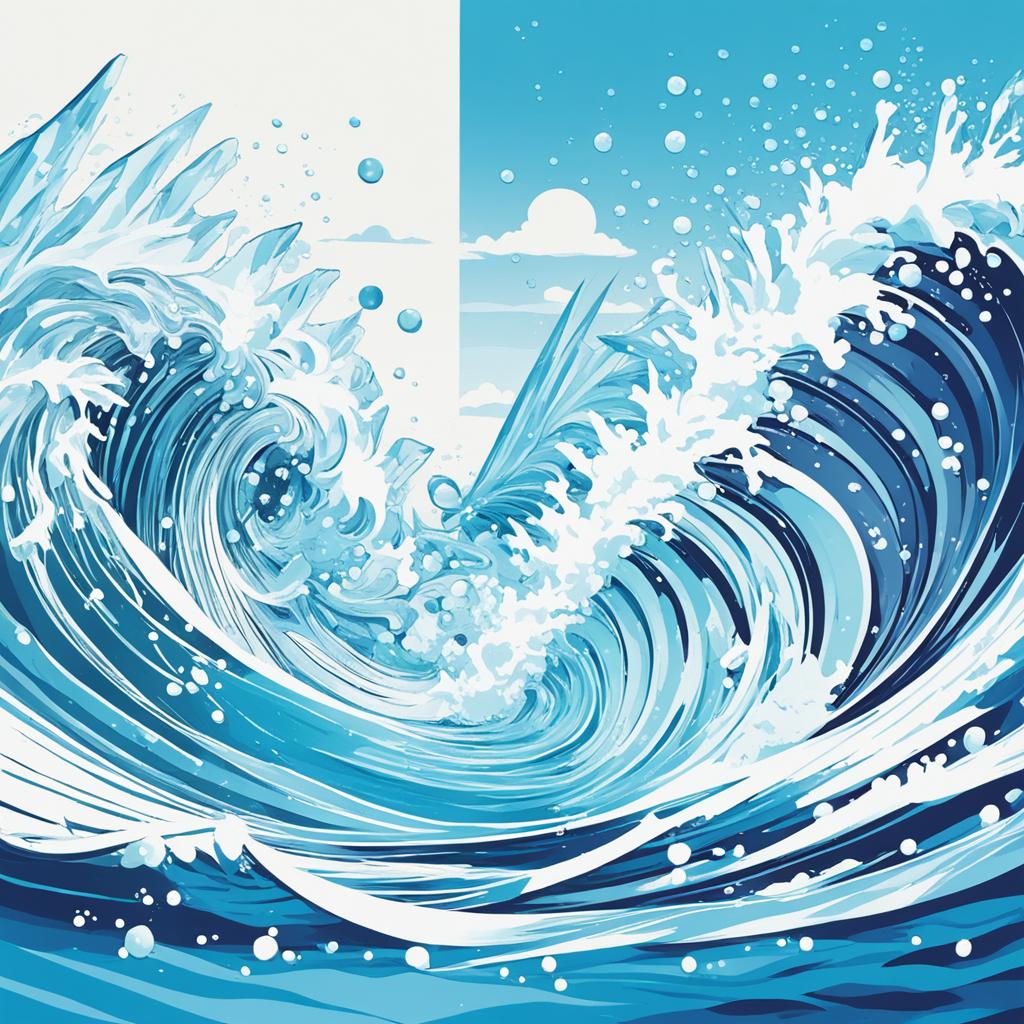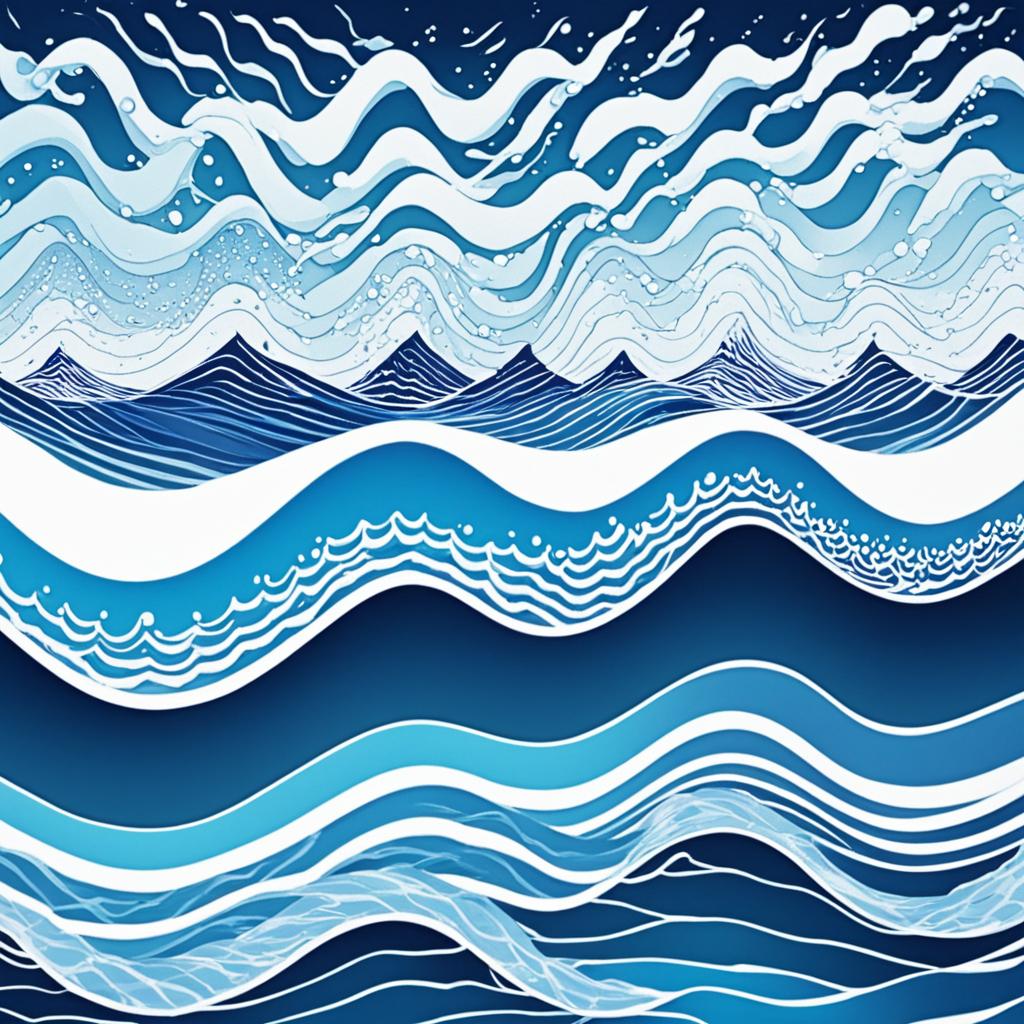Have you ever wondered if sound travels faster in ice or water? It’s a question that challenges our understanding of the properties of these two materials. Many of us may assume that sound would propagate faster in water due to its density, but is that really the case?
Let’s dive deeper into the science of sound propagation and explore the speed of sound in ice and water. We’ll uncover the factors that determine the velocity of sound waves and discover surprising insights about how sound moves through these mediums.
So, join us on this sonic journey as we explore the fascinating world of sound and reveal whether ice or water takes the crown for the fastest sound travel. Prepare to be amazed by the surprising truth!
The Science behind Sound Propagation

Sound is a compression wave that travels through a material, propagating energy and transmitting information. It can be conceptualized as a grid of atoms connected by springs, where the atoms represent the particles of the material and the springs represent the chemical bonds between them.
The speed at which sound travels through a material depends on two main factors: the stiffness of the material and its density. Stiffer materials have faster sound propagation because the springs representing the chemical bonds snap back faster, allowing the compression wave to travel more rapidly. On the other hand, denser materials have slower speeds of sound as more interactions between neighboring particles are required for the wave to propagate.
The stiffness of the chemical bonds in a material is a crucial determinant of sound speed. Think of it as the strength of the springs connecting the atoms in the material. For example, materials with strong chemical bonds, such as metals, tend to have high stiffness and therefore exhibit fast sound propagation. In contrast, materials with weak bonds, like gases, have low stiffness and consequently slower speeds of sound.
Density also plays a significant role in sound propagation. It refers to the mass density of the material, which is the amount of mass per unit volume. Heavier materials with higher densities, such as solids, generally have slower sound speeds, while lighter materials like gases have faster sound speeds due to their lower density.
In summary, the speed of sound is determined by the interplay between the stiffness of the chemical bonds and the mass density of the material. Stiffer materials with lower densities tend to have faster sound propagation, while less stiff and denser materials exhibit slower speeds of sound.
| Material | Stiffness | Density | Speed of Sound |
|---|---|---|---|
| Steel | High | High | Approximately 5,960 m/s |
| Water | Medium | Medium | Approximately 1,480 m/s |
| Air | Low | Low | Approximately 343 m/s |
Why Does Sound Speed Matter?
Understanding the science behind sound propagation is essential in various fields such as engineering, architecture, and environmental science. For example, in structural engineering, knowing the speed of sound in different materials helps determine the transmission of sounds through buildings and the potential for echoes or vibrations.
Furthermore, studying the speed of sound in different mediums provides insights into the behavior of materials and helps scientists develop new technologies. For instance, in the field of medical imaging, knowledge of sound speed in tissues aids in the development of ultrasound machines and helps healthcare professionals visualize internal organs and detect abnormalities.
By studying the relationship between sound speed, material properties, and density, researchers can also gain valuable information about the composition and structure of various substances. This knowledge can be applied in fields like geology, where sound speed measurements help determine the properties of rocks and underground formations.
In conclusion, the science behind sound propagation reveals the importance of understanding the interaction between material properties such as stiffness and density. This knowledge has practical applications in diverse fields and contributes to advancements in technology and scientific understanding.
Speed of Sound in Ice
The speed of sound in ice is an intriguing phenomenon. Unlike water, where sound travels slower, ice allows sound waves to propagate at an astonishing speed. In fact, the speed of sound in ice is nearly three times faster than in water.
This remarkable difference in speed can be attributed to the unique properties of ice. The molecules in ice are intricately arranged, forming a crystal lattice structure. This specific arrangement enhances the elasticity of ice, enabling it to quickly snap back into place after being stimulated by a sound wave. The high elasticity of ice results in the acceleration of the sound wave, leading to a faster speed of sound compared to water.
To visualize this concept, imagine plucking a taut rubber band and observing how quickly it returns to its original shape. Similarly, the molecules in ice behave in a similar manner, promptly reverting to their original positions after being disturbed by a sound wave.
This accelerated speed of sound in ice has important implications in various fields. For example, scientists studying seismic activity rely on measuring the speed of sound in ice to accurately determine the properties of glaciers and ice sheets. Furthermore, understanding the speed of sound in ice is crucial for polar exploration, as it affects sonar systems used for navigation and communication in polar regions.
To summarize, the speed of sound in ice is remarkable and significantly faster than in water. The elastic properties of ice allow sound waves to propagate at an accelerated pace, making it a fascinating topic of scientific study.
Speed of Sound in Water

The speed of sound in water is about 1,480 meters per second. In water, the molecules are less elastic and more dense compared to ice. This means that more interactions between neighboring molecules are required for the sound wave to propagate, making it slower compared to ice. However, the stiffness of the chemical bonds in water compensates for the high density, resulting in a faster speed of sound compared to air.
| Material | Speed of Sound (meters per second) |
|---|---|
| Air | 343 |
| Water | 1,480 |
| Ice | 4,350 |
In comparison to air, the speed of sound in water is significantly higher, demonstrating the impact of the medium on sound transmission. While water may not be as fast as ice, it still surpasses the speed of sound in air. This illustrates the unique properties of water as a medium for sound propagation, making it crucial in various applications such as underwater communication and sonar technology.
Sound Transmission from Air to Water

When it comes to sound transmission, the transition from air to water presents some challenges. Unlike in the air, sound waves have a difficult time propagating through water and primarily get reflected at the air-water interface.
Imagine when you talk, you emit air and send compression waves through this medium. To be heard underwater, the sound waves have to travel from the air into the water. However, instead of smoothly transitioning and being transmitted, the majority of sound waves are reflected back into the air.
This characteristic makes it harder to communicate or have clear conversations underwater compared to in air.
Effect of Temperature on Sound in Water
The speed of sound in water is influenced by temperature. Sound travels slightly faster in warm water compared to cold water. Even though the molecules are closer together in cold water, the higher temperature creates a medium that allows sound to travel faster. Sound travels about 15 feet per second faster for every 1.8 degrees Fahrenheit rise in temperature.
If you consider a glass of warm water and a glass of cold water, you might notice a difference in how sound travels through each. When you speak near the glass of warm water, you’ll notice that the sound seems to travel more quickly, reaching your ears sooner compared to the glass of cold water. This is because the temperature of the water affects the speed at which sound waves propagate.
The phenomenon can be explained by the behavior of molecules in water. At higher temperatures, the water molecules have more kinetic energy and are in constant motion. This increased motion allows sound waves to propagate through the water more rapidly.
In contrast, colder water has slower-moving molecules with less kinetic energy. As a result, sound waves encounter more resistance and take longer to travel through the water. Despite the fact that cold water molecules are closer together, their reduced energy results in a slower speed of sound compared to warm water.
Understanding the effect of temperature on sound in water is essential in various fields of study. For example, oceanographic researchers rely on this knowledge to determine the temperature of the oceans by measuring the speed of sound. By analyzing the variation in sound speed with temperature, scientists can gather valuable data that contributes to climate studies and aids in the analysis of the impact of greenhouse gases on global temperatures.
Overall, temperature plays a crucial role in the speed of sound in water. The relationship between temperature and sound propagation can be attributed to the kinetic energy and motion of water molecules. So, the next time you notice a difference in the way sound travels through warm and cold water, remember that temperature influences the speed at which sound waves travel.
Significance of Sound Speed Measurement in Water
The measurement of sound speed in water plays a crucial role in scientific research, particularly in determining the temperature of the oceans. By studying how the speed of sound changes with water temperature, scientists can gather valuable data for analyzing the impact of greenhouse gases and global temperatures.
As water temperature affects the speed of sound, it also influences various oceanic processes and phenomena, such as the distribution of heat and the movement of currents. Understanding these mechanisms is essential for climate studies, helping researchers assess the effects of climate change on our planet.
Accurate sound speed measurements allow scientists to monitor and identify changes in ocean temperatures over time. This data enables them to make informed predictions about future climate trends and patterns, aiding in the development of strategies to mitigate the impact of global warming.
FAQ
Q: Does sound travel faster through ice or water?
A: The speed of sound in ice is nearly three times faster than in water.
Q: What is the science behind sound propagation?
A: Sound is a compression wave that travels through a material. It can be conceptualized as a grid of atoms connected by springs. Stiffer materials have faster sound propagation as the springs representing the chemical bonds snap back faster. Density also plays a role, with heavier materials having slower speeds of sound. The speed of sound is determined by the stiffness of the chemical bonds and the mass density of the material.
Q: What is the speed of sound in ice?
A: The speed of sound in ice is nearly three times faster than in water.
Q: What is the speed of sound in water?
A: The speed of sound in water is about 1,480 meters per second.
Q: How does sound transmission from air to water work?
A: Sound has a hard time transitioning from air to water and mostly gets reflected at the air-water interface. When we talk, we emit air and send compression waves through this air. To be heard underwater, the sound waves have to go from air into the water, but they primarily get reflected instead of being transmitted. This is why it is harder to talk to someone underwater compared to in air.
Q: How does temperature affect the speed of sound in water?
A: Sound travels slightly faster in warm water compared to cold water. Even though the molecules are closer together in cold water, the higher temperature creates a medium that allows sound to travel faster. Sound travels about 15 feet per second faster for every 1.8 degrees Fahrenheit rise in temperature.
Q: What is the significance of measuring sound speed in water?
A: The ability to measure the speed of sound in water helps scientists determine the temperature of the oceans. By understanding how the speed of sound changes with water temperature, scientists can gather data that can be used to analyze the impact of greenhouse gases and global temperatures. This information is crucial for climate studies and understanding the effects of climate change.
